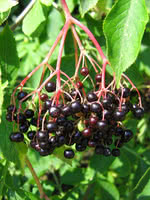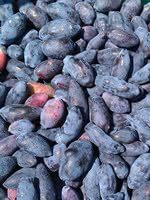Mon-Fri 9am - 5pm Mountain time
Black Elderberry vs Blue Stuart Haskap (Honeyberry)
Sambucus canadensis
Lonicera caerulea Blue Stuart
NOT AVAILABLE THIS SEASON - MIGHT RETURN
NOT AVAILABLE THIS SEASON - MIGHT RETURN
Black Elderberry is a deciduous shrub native to eastern North America. You can plant this shrub in moist areas and it will help stabilize your soil. You can also use it on rural properties anywhere you'd use a lilac.
Black Elderberries are considered to be partially self-pollinating. So while they will still produce some berries without cross-pollination, planting with another variety will increase yields. Consider planting with Ranch Elderberry or Bob Gordon Elderberry.
Warning: the seeds, stems, leaves, roots, and uncooked berries of the Black Elderberry are poisonous to humans when eaten in quantity. You should cook the berries to make them safe for human consumption.
The Blue Stuart Haskap is a fruit-bearing shrub that produces medium-sized, oval-shaped and sweet berries. Their taste is typically described as something between a raspberry and a blueberry. The berries are ready for harvest through June and July, and are of medium firmness.
The Blue Stuart Haskap, or Blue Stuart Honeyberry is a cultivar of Russian origin bred by Lidia Stuart who grew up in far eastern Russia.
Blue Stuart is a late pollinating variety. Pair with other late pollinators to have a higher yield.
Blue Banana is a great companion variety.
Black Elderberry Quick Facts
Blue Stuart Haskap (Honeyberry) Quick Facts
Toxicity: leaves, stems, and uncooked berries are poisonous to humans

